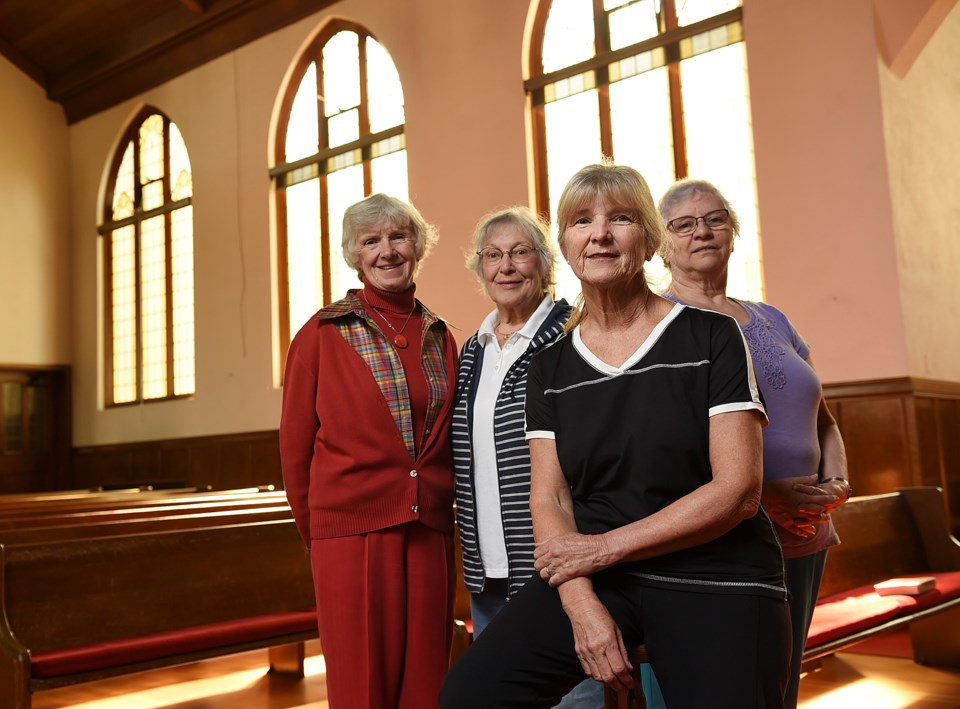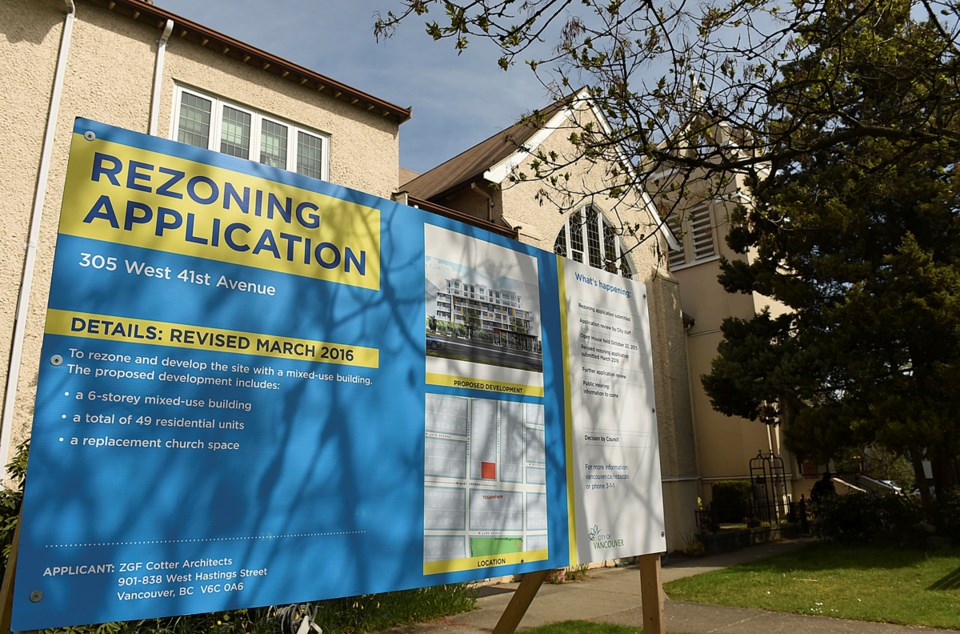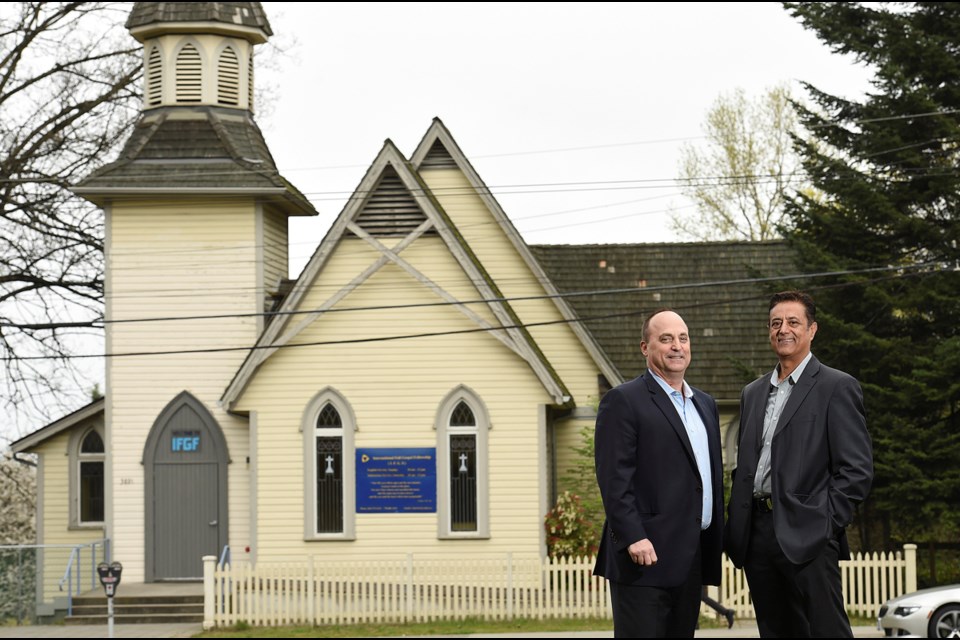For Valerie Weinert, life happened at church.
She remembers learning about God in the gym during Sunday school. She remembers saying her wedding vows at the front of the stained-glassed sanctuary. She remembers longtime friends who have passed away.
Weinert was born in 1948. She attended Oakridge United Church growing up, six blocks east from her family’s duplex on Cambie and 46th. But development is coming to the site, and the church building of nearly seven decades will be demolished.

“It’s like any family home,” said Weinert. “You lose a family home and you remember all the good times you’ve had. Even when you’ve got all the memories, it’s still a sad thing.”
Weinert remembers having to sit in the basement with her parents whenever they were late for big Christmas and Easter. They had to listen to the service from a pipe because the upstairs was packed.
There isn’t that kind of attendance today. There are now 60 regular churchgoers, most over 50 years of age. That’s why the United Church has decided to redevelop the site in partnership with a developer. Fifty-eight condos will be built, and the congregation will meet in a smaller space in the building.
HOLY ROLLERS
Just like how Vancouverites are hard-pressed for housing solutions in the expensive city, churches have also been forced to get creative with the space they have. After all, their land is worth millions.
Oakridge Lutheran a block away is also partnering with a developer to downsize and bring in housing units. Downtown’s Coastal Church made a deal with developers who put Vancouver’s tallest tower — the 62-storey Shangri-La Hotel — on the property beside the church building. In exchange, they got a $4.4-million renovation.
“Real estate is real estate at the end of the day,” said Rav Rampuri.
He and his partner Leonardo Di Francesco are the Holy Realtors. They’ve been selling religious properties together for 21 years, everything from churches to temples to mosques, and they’ve seen the market heat up like never before.
The Holy Realtors used to have up to seven properties for sale a time. No one has that many listings today. As soon as a reasonably-priced church is on the market, it’s snapped up.
Some groups don’t even care if a building is from a different faith. A Buddhist monastery once purchased the art deco Salvation Army Temple at Hastings and Gore. A mosque took over a Chinese Mennonite church near Commercial and Broadway. And if another religious group doesn’t snap up the property, a developer usually will.
“The value of the land outweighs the capacities of some groups to buy them,” said Rampuri. On the East Side, churches sell for about $2 million and up. On the West Side, about $5 million and up.
“I’m not a big fan of development — me and Leo love to sell buildings to maintain the church status — but my manager said to me earlier: God also renovates.”
RENT TO PRAY
Vancouver’s churches are not all decades-old neighbourhood establishments. There are many young churches too, and like young residents in the city, they can’t afford to buy, only rent. Young churches have also had to get creative with their options.
Renting churches have sung their hallelujahs at the Hollywood Theatre on West Broadway, the Rickshaw Theatre on East Hastings, the gym of Charles Dickens elementary, Granville Island’s Arts Club, the Empire Landmark Hotel, UBC Robson Square, the central library and even the nightclub AuBAR.
Dennis Wilkinson was a pastor who wanted to start a new church in the city. He came to Vancouver from Winnipeg in 2011 with the vision for a neighbourhood-oriented church in the West End.
Friends warned him that not everyone in the West End was friendly towards churches and it would be hard to find an affordable space to rent, not to mention a nearby home for his family of six. While the West End has the city’s largest concentration of artists, it’s also known for its lack of community venues.
“You have to be really creative if you’re going to come into a city with a family and a faith,” said Wilkinson.
The church, Meta Communities, doesn’t meet in an actual church building every week, but it’s helped with their outreach. They use Wilkinson’s three-bedroom home, the West End’s playgrounds and pubs and even picnics and barbecues to meet the neighbours. Their core members number 30, but community events often have up to 150 attendees.
URBAN PLANNING
The sheer cost of Vancouver might beg the question of why churches are choosing to start in the city rather than the suburbs. One answer lies in religion’s decline.
More than a quarter of Canadians said they had no religious affiliation in the 2011 National Household Survey. In Metro Vancouver, the share of unreligious is even higher at 41 per cent. The liberal mindedness of North America’s west coast is known for being more resistant to religion.
For this very reason, Mark Burch says that’s why church “plants” such as Meta Communities are targeting cities. Burch is the national associate director of C2C, a Canada-wide network that supports church planters — individuals who see the need for a new church in a neighbourhood and usually begin in a grassroots way by meeting in homes or renting.
“For years churches moved away from the cities,” said Burch. “They would maybe sell a building in the urban core and move out to the suburbs and buy a chunk of land. Churches have typically done better in rural than in suburban locations. But in the last 10, 15 years, there’s been a bunch of planters coming back to the urban core saying, hey, we gotta reach our cities.”
LOSS OF HERITAGE
Whether sharing, rezoning or renting will be the saviour of churches in increasingly expensive Vancouver, it’s likely that a few, rare buildings will be lost along the way.

Oakridge United was included on Heritage Vancouver’s list of top endangered sites last year. Another church, Kerrisdale Baptist, made the list the year before. Eleven religious properties have been demolished since 2000, according to city data.
“I will be one of those who weep when the building goes down,” said Oakridge United’s Rev. Neill McCrae.
The congregation has until the end of the year to say goodbye — goodbye to the cornerstone, goodbye to the bell tower, goodbye to the sanctuary, goodbye to another house in Vancouver.
bychrischeung@gmail.com
@bychrischeung



